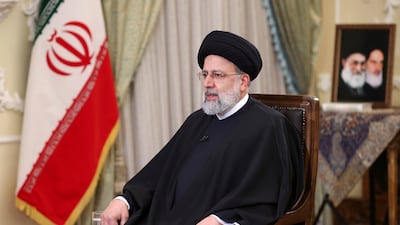Iranian President Ebrahim Raisi told state TV that a nuclear deal with world powers and the US would be possible if sanctions were lifted.
Mr Raisi’s comments came shortly after Iranian Foreign Minister Hossein Amirabdollahian opened the door to the possibility of Iran engaging directly with the US if direct talks would allow for all parties to reach a good deal.
“If the parties are ready to lift the oppressive sanctions, it is quite possible any agreement can be reached,” Mr Raisi said in a live interview on Tuesday.
Other senior government officials in Iran also expressed the same sentiment as both Mr Raisi and Mr Amirabdollahian. The head of Iran's Supreme National Security Council said direct talks with the US could be on the table should a good agreement be within reach.
Iran and world powers have been engaged in talks in Vienna in an effort to salvage the largely defunct 2015 Nuclear accord. The meetings include all the deal’s remaining signatories – Iran, Britain, France, Germany, Russia and China.








Although an original signatory to the deal, the US has participated indirectly in the talks. Washington's 2018 withdrawal from the deal and its sanctions on Iran put the US in breach of the original accord.
Since US President Joe Biden took office, he has signalled his intention to rejoin the deal and his administration has said it is prepared to hold direct talks with Iran on its nuclear programme, a position the state department confirmed on Monday.
“We have consistently held the position that it would be much more productive to engage with Iran directly on both [nuclear deal] negotiations and on other issues,” State Department spokesman Ned Price told reporters on Monday.
In 2018, Iran’s supreme leader Ayatollah Ali Khamenei, who has the final say on all state matters, banned any negotiations with the US, saying talks with America would only harm Iran.
However, over the past few months, Mr Khamenei has left room for the possibility of direct engagement with Washington on the issue of the nuclear deal.
US Secretary of State Antony Blinken said last week that talks with Iran over its nuclear programme are at a “decisive moment,” and issued a warning that Washington and its allies may change tactics if a deal is not reached in the coming weeks.
The UK's Foreign Minister Liz Truss also took a harsher stance on Monday.
She said the talks had not been "fast enough" and if talks in Vienna collapsed, "all options" would be on the table on dealing with Iran.


